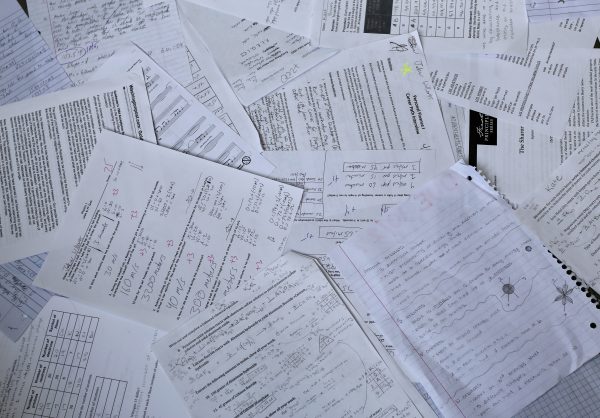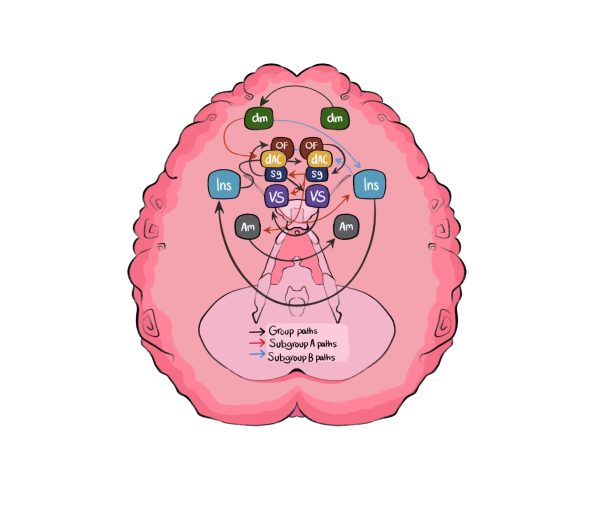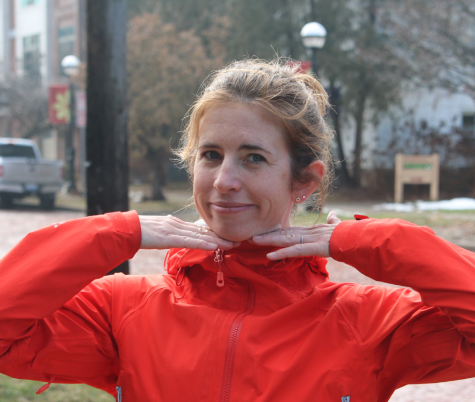The End of the World on Our Minds
Art by Rosie Mellor
When 6-year-old Tova Weiss read facts like, “In less than 50 years, these coasts will be underwater!” she would collapse into meltdowns.
Non-fiction books, often sparking interest in dinosaurs or the oceans for other young readers, would instead bring Weiss to tears. She was unable to face discarded plastic water bottles, or recyclables placed in the wrong bin, without her thoughts jumping to each piece’s impact on the Earth. Weiss believed each bottle and wrapper she saw to be her responsibility, weighing on her with each year the plastic would remain in landfills and oceans, unable to decompose until the year 3000.
Now 13 years old and facing statistics rapidly ticking closer—50, 30, 10 years—Weiss’ anxieties build, but she is learning to face the reality of the climate crisis differently.
Climate anxiety is defined as “negative cognitive, emotional, and behavioral responses associated with concerns about climate change” by the National Library of Medicine. The deadline for irreversible changes to our climate creeps closer, natural disasters worsen and sea levels rise, all while real, systemic policy changes are yet to be seen.
Over the past five years, Naomi Zikmund-Fisher, an Ypsilanti-based therapist, has seen climate anxiety appear more often in conversations with her patients. Zikmund-Fisher has found climate anxiety different to work with compared with other anxieties that might be unrealistic. For example, “everyone hates me” isn’t a concrete fear. But the climate is changing, and anxiety about a liveable future is a fact. “It’s not a question of is it true or not true,” Zikmund-Fisher said.
So what’s changed in the past five years? Partly, the ease with which social media provides for sharing information and connecting across distances and demographics, contributing to more widespread knowledge about the climate crisis. There is a large difference between climate justice movements of today and those of the past, Jumana Vasi has observed. Vasi, now an Ann Arbor-based consultant to environmental justice nonprofits, began working in environmental justice in 2002.
“When we started, it was just us and whoever else you knew in your organization or in your network,” Vasi said. “But now the movement is connected in such an amazing way and I think young people are the ones to navigate that and to use it and know how to leverage it.”
Being connected to other teens that are passionate about the climate crisis helps Weiss work through with her fears.
“Whatever happens, I’m not going to be alone trying to stop it,” Weiss said. “I’m not going to be alone in experiencing it.”
Weiss is a leadership board member for the Jewish Youth Climate Movement (JYCM). JYCM is a national youth-led movement, founded in 2019, working to empower Jewish youth to be leaders in climate activism. Weiss got involved in JYCM in 2020, hoping to bring a part of the movement to her hometown, Ann Arbor.
Growing up in Ann Arbor, individual action was the only way Weiss knew to do her part against climate change. She remembers making flyers with crayons and markers, asking people to recycle and reuse products and obsessing over her own recycling habits at home. As she’s gotten older, she’s learned that viewing individual action as her only option to create an impact is not just exhausting, but also ineffective. Stepping into a larger-scale position, especially policy work and movements like JYCM, is new for Weiss. On JYCM’s board, Weiss participates in Jewish ritual and cultural work, connecting Judaism to the climate crisis through Jewish prayers and practices through a lens of environmentalism.
Avivah Mitchel, a senior at Skyline High School in Ann Arbor, often weighs her personal impact against the enormity of the climate crisis. Major corporations and wealthy elites wield the power to tip the scales, yet they choose to continue pushing the crisis in the wrong direction.
“It feels so absurd to me,” Mitchel said. “They are knowingly doing that. Part of what gives me so much anxiety is to think about how there are people that are doing this.”
Feeling powerless while watching our reality worsen is terrifying for Mitchel. So many of the effects of climate change can be predicted by scientists. These impacts are already being felt and will increase in severity and frequency.
Air pollution and heat waves will continue to harm people’s health, particularly marginalized communities such as people of color, people with disabilities, children and the elderly. Severe weather will do the same, only worsening as time goes on. The infrastructure where these vulnerable communities live is not equipped to handle these impacts due to systemic under investments that are a part of systemic racism, Vasi explained.
“There’s this clock, that’s literally ticking,” Mitchel said. “I feel like I can hear it clicking in my head.”
It’s easy to get caught in a spiral of worries when thinking about the climate crisis.
“Sometimes I get so anxious that there’s nothing we can do that I end up actually doing nothing,” Mitchel said.
This only prompts her anxieties to loop back around endlessly. Not only is climate anxiety detrimental to mental health, it stands in the way of doing something about those worries, because so much energy is spent being scared. Zikmund-Fisher offers an analogy: If your house is on fire, and the fire department shows up, you don’t want the firefighters to be terrified of the fire. If they’re freaking out, they can’t help you. So if we want to help with climate change, we actually need to put it in a space of accepting its reality and its importance, while recognizing that being afraid of it day in and day out is not productive.
“A lot of my anxiety is also rooted in the fact that I am in a place of privilege in a lot of ways when it comes to climate change, and I need to be utilizing that more,” Mitchel said.
Experiencing climate anxiety as fear and grief for the future is a privilege. Having that level of separation from the climate crisis’ current effects is not a reality for all people. Vasi works with communities whose climate anxiety is defined differently.
“When there are climate impacts from wet weather, [these groups] have a lot of anxiety because their homes are damaged, unlivable [and] they often aren’t able to get them repaired,” Vasi said. “If you are living with a lot of real life issues, I don’t know that you have time to think about sea level flooding in the future.”
Vasi has noticed that people in her line of work deal with climate anxiety differently than the people they support at a community level.
“You’re faced with the data, and then you see the impacts, and it all hits the most vulnerable people,” Vasi said. “It makes me feel frustrated with the system because we pay people who do some of the most important work, nothing or very little. And so much of this [work] falls on the back of women, frankly, and women of color.”
More and more, Mitchel has been frustrated by older generations saying they feel hopeful about the climate crisis because they know younger generations are going to make a difference.
“That just baffles me,” Mitchels said. “When people say, ‘it’s your responsibility,’ the first thing I think about is, ‘you’re still alive.’ Why aren’t you doing anything?”
Mitchel feels that it’s both unfair and contradictory for older people to push this work off to younger generations. Teens under 18 can’t vote, and face more limits than many adults do, both legally and financially.
“We are looked down upon and not believed in many circumstances and climate change is one of them,” Mitchel said. “But now, [the climate crisis] is our responsibility.”
Mitchel’s climate anxiety is present in her thoughts about where she will live in the future.
“Michigan is being seen as a potential climate refuge, a place less at risk to harmful climate change impacts than many other states around the country, particularly in the southern tier of the country and along the coasts,” University of Michigan climate scientist Jonathon Overpeck said in a climate change Q&A. “Michigan’s climate change woes are not as challenging as in the West, the South or along our nation’s ocean coasts..”
But what will the future look like for the areas not so lucky?
“Where are people going to live?” Mitchel wonders.
It’s hard to find hope when projections for the future only seem to get worse. But finding connection and hope in the human spirit can lighten the load.
“It’s really easy to get stuck in your own head,” Mitchel said. “But then when you think about [how] you’re not the only one at all, then it makes it a lot easier.”




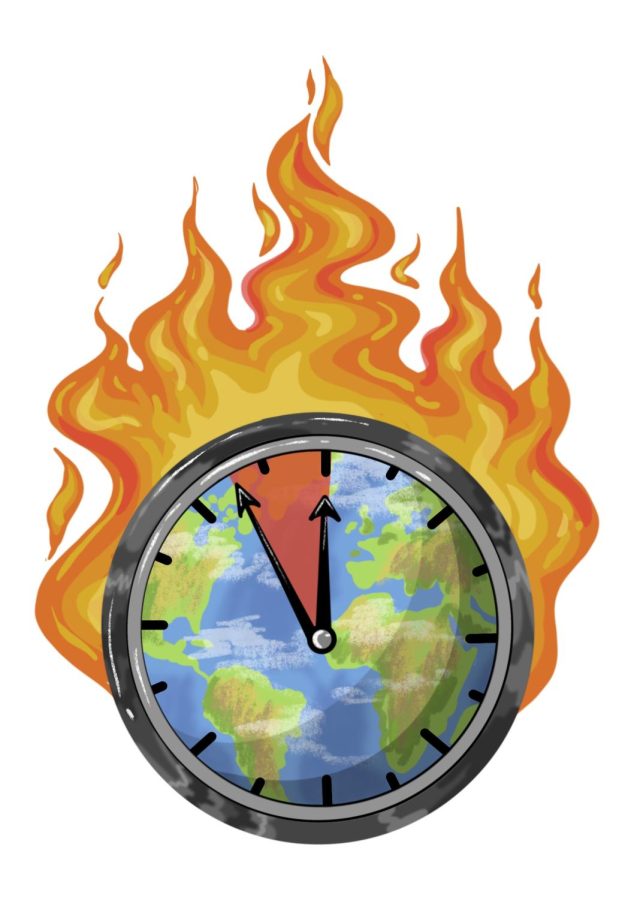



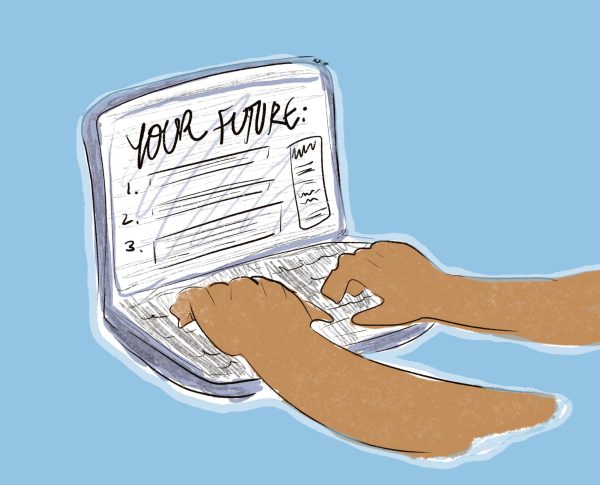

![[Caption]. [] by [Graphic by Sarah Fay] is licensed under [CC BY-NC-].](https://chscommunicator.com/wp-content/uploads/2023/12/mentalhealth_image-600x450.webp)
